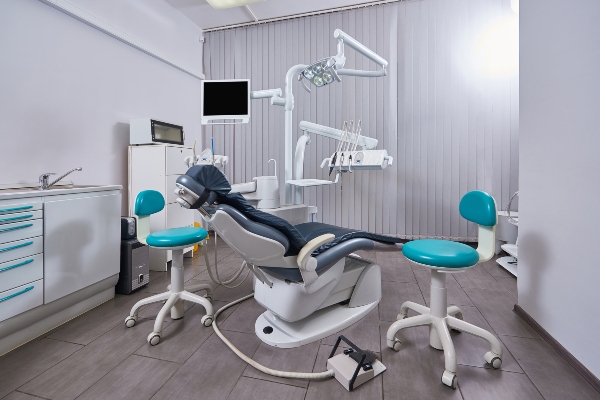 Though many dental practices may label themselves as temporomandibular joint dysfunction (TMJ) treatment centers, a
general dentistry office is more than qualified to help patients suffering from symptoms of TMJ. Learn more below about the symptoms of TMJ, treatments a general dentist may try, and what can happen if you delay treatment.
Though many dental practices may label themselves as temporomandibular joint dysfunction (TMJ) treatment centers, a
general dentistry office is more than qualified to help patients suffering from symptoms of TMJ. Learn more below about the symptoms of TMJ, treatments a general dentist may try, and what can happen if you delay treatment.
What is TMJ?
TMJ is a shorthand way of referring to temporomandibular joint dysfunction. When a dentist refers to "TMJ," this professional refers to both the joint itself and the pain that may be caused if it is not working properly. TMJ symptoms may be caused by bruxism, jaw clenching, arthritis, injury, or a dysfunction of the jaw joint itself. According to the Mayo Clinic, symptoms a TMJ patient may experience can include the following:
- Pain in or around the jaw area
- Pain in the temporomandibular joints
- Earaches
- Trouble talking, chewing, kissing, or doing anything that involves moving the jaw
- Locking of the jaw (which can be an emergency situation if it is severe)
How can a general dentistry practice treat TMJ?
General dentistry practices focus on determining the cause of the patient's TMJ in order to devise the most appropriate treatment plan. For example, if the patient's TMJ is becoming sore due to nighttime grinding, or bruxism, the dentist may prescribe a nightguard that does not allow the patient to grind or clench their teeth while sleeping. Other patients who have recurring TMJ after eating specific foods may need to transition to a softer diet for a while to give the TMJ time to heal.
It is important to note that a minority of patients have TMJ issues that stem from a condition such as arthritis, while other patients grind teeth due to excessive stress. However, even if this is the case, nightguards and other TMJ treatments can provide symptomatic relief for the jaw pain caused by these conditions. Therefore, a general dentist should further advise patients on this issue.
It is never wise to delay treatment for any dental condition — especially if you are experiencing a great deal of pain that does not go away with self-treatment. Instead, patients with TMJ symptoms should visit a licensed general dentistry office to discuss symptoms with the dentist and determine the next step forward. TMJ can wreak havoc on a person's quality of life with chronic muscle pain, jaw symptoms, and headaches that stem from the sore joints, ligaments, and muscles.
Conclusion
Seeking out treatment for TMJ conditions can be complicated. Still, patients should start with their general dentistry office to gain solid advice from a trusted professional and create a treatment plan. Patients should note that many professionals claim to be TMJ specialists who do not have any license or specific qualifications for treating this condition. Try to avoid claims that seem too good to be true and practices that offer treatments that have no research backing the claims. Most cases of TMJ can be successfully helped within a general dentistry practice.
Request an appointment or call Ascot Family Dental at 916-839-3039 for an appointment in our Roseville office.
Related Posts
General dentistry is the most common form of dental care. Patients go to general dentists for diagnostic, preventative, and restorative care. Practitioners can perform various types of care for a patient's oral health needs, including the placement of dental bridges. Primary dentists may also educate patients regarding oral hygiene and dental care.Practitioners of general dentistry…
Most people will develop at least one dental cavity by the time they reach adulthood. The most common type of general dentistry treatment for a cavity is a filling. However, many patients prefer to avoid dental work whenever possible, including fillings. In addition, some products and natural remedies claim to heal tooth decay and repair…
It is widely known in general dentistry that some foods are better for the teeth and gums than other foods. Consistently eating foods that are bad for your teeth can, over time, lead to painful dental conditions that are often costly to treat. Fortunately, it is easy to avoid or reduce certain foods to lower…
